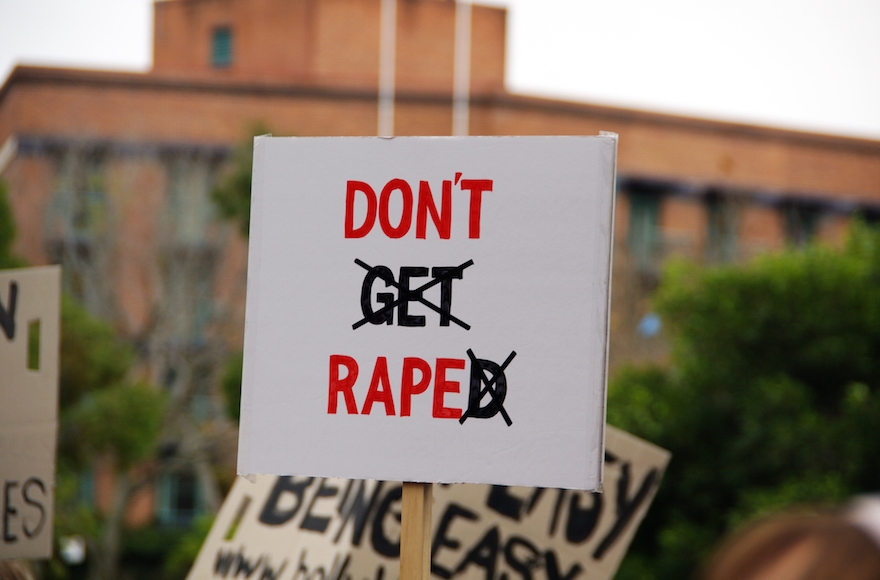(JTA) — Rabbi Steven Pruzansky, the spiritual leader of Congregation Bnai Yeshurun in Teaneck, New Jersey, is no stranger to controversy. In statements from his pulpit and in blog posts, he has demonized Israel’s late prime minister Yitzhak Rabin, called for the collective punishment of Palestinian “savages” and, after Israel’s withdrawal from the Gaza strip, let it be known that the Jewish state was no longer worthy of his political or financial support.
While many have chosen to ignore him as inconsequential, his statements have been condemned over the years by the Orthodox Union, the Rabbinical Council of America (where he formerly served as vice president) and the Anti-Defamation League. As the past president of the Rabbinical Council of Bergen County in New Jersey, and a former dayyan, or judge, on the Beth Din of America, he has held some of the most prominent positions in modern Orthodoxy and continues to enjoy the support of his large and influential congregation.
From his position of prominence, Pruzansky recently authored a blog post asserting that in many cases, women who report being raped on college campuses are leveling false allegations because they felt spurned by their romantic partners or were intoxicated at the time of the act. Citing no evidence other than “media reports,” he asserts that most reported rapes on campus are “situations in which the couple had a romantic relationship that went sour.” Having treated intimacy as “something casual and cavalier,” he writes, many accusers bear responsibility for the “misunderstandings, miscommunications and gray areas” that are erroneously called “rape” (his quotation marks).
“If indeed there was a ‘rape culture’ on American campuses,” writes Pruzansky, “no intelligent woman would want to attend college. The fact that more women attend college today than men itself belies the accusation.”
Pruzansky failed to acknowledge that, according to a U.S. Department of Justice survey, during their time on a college campus one in five women are victimized, which includes completed rape, a verbal or physical threat of rape or unwanted attempted sexual contact. However, “fewer than 5 percent of completed and attempted rapes were reported to law enforcement officials,” the study concluded. Rape and sexual assault are happening. They are not happening because women are “serially promiscuous” and regretting their consensual sexual encounters. While Pruzansky might want to pretend his words only apply to those engaged in the “hookup culture,” or that those who adhere to “traditional morality” are immune from assault, Orthodox women might disagree.
Even in the context of an Orthodox Jewish university, students can and should be advocating for awareness of rape and sexual abuse, and some brave individuals are. Sarah Robinson, an alumna of Stern College for Women and a current student at Yeshiva University’s graduate program in advanced Talmudic studies, boldly spoke out on the issue in The Observer, Stern College’s official newspaper.
“Our campus culture [at Yeshiva University] does not support victims of sexual violence,” she told a reporter. “It is immature and ignorant to think that consent doesn’t apply to students who are “shomer negiah,” meaning those who refrain from physical contact with members of the opposite sex. “Marital rape happens all the time. There are so many women who want to say no but don’t know how.”
Robinson added: “Rape can happen to anybody. Generally rape occurs between two known parties. Shomer negiah doesn’t protect against rape.”
Blaming the victim is not an excuse that is solely employed by Pruzansky, but it is disturbing given his fairly prominent position.

Sharon Weiss-Greenberg (Courtesy of Sharon Weiss-Greenberg)
As Passover approaches, we are ready to say “dayenu,” enough.
Some people may shrug off the angry and misguided words of a pulpit rabbi, and many have done so for decades. But a rabbi who presides over a congregation of more than 600 families is not marginal. A rabbi who has been awarded leadership positions in the RCA and the Beth Din of America is not marginal. A rabbi who chooses to share his thoughts on a blog that is accessible to anyone across the globe is not marginal. A rabbi who has influence over hundreds of our children is not marginal.
It is time to stop shrugging our shoulders and pick up the phone, send emails and advocate for the type of community that Judaism should stand for.
On June 26, Pruzansky’s synagogue will host a daylong conference of Jewish educators. The “yom iyun,” focusing on educating and inspiring our children, will include participants from more than 30 Orthodox yeshivas, day schools, publishers, youth groups and synagogues.
The Jewish Orthodox Feminist Alliance is asking those who plan to attend to make clear that their sponsorship and participation is contingent on Pruzansky not speaking at the conference and, preferably, a change of venue from Bnai Yeshurun. We are asking people to reach out to any of the partnering organizations with which they are affiliated. In doing so, they will take a great step in educating our children about justice and acceptable behavior.
Pruzansky’s insensitivity and failure to understand the violent and vicious nature of rape, confusing it with unsatisfying sex and “unrequited love,” indicates he should not be in a position to preach about values we want to pass on to our children.
I am asking everyone to keep writing emails and making calls to the partnering organizations and sponsors. A conference that is striving to promote “Building Strong Families Together” should not provide yet another platform for inaccuracies and hatred, nor should the conference be held in the locale that allows such words to permeate the community at large.
(Sharon Weiss-Greenberg, Ph.D., is executive director of the Jewish Orthodox Feminist Alliance.)
CORRECTION: A previous version of this article referred to a Department of Justice survey on “The Sexual Victimization of College Women” without adequately distinguishing between incidents of victimization and the number of incidents that are actually reported to law enforcement. The article has been corrected.
JTA has documented Jewish history in real-time for over a century. Keep our journalism strong by joining us in supporting independent, award-winning reporting.







